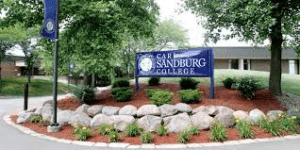As career and technical education focuses among students continue to grow, Spoon River College is expanding to support that need locally in Macomb, informs President Curt Oldfield:
“We are really starting to expand our Career and Technical Education program and the importance that has in our economy to have graduates that know how to work with their hands and their minds and be able to solve problems that our communities are facing. We really want to support those, so our devour of growth is going to happen in Macomb. We have a new campus coming in Macomb this fall. In 2009, the Board of Trustees bought an old K-Mart building in Macomb on East Jackson Street and part of that building got remodeled for continuing education and workforce development center, but that was only about one third of the building. It is approximately a 100,000 square foot building, so we had about 66,000 square feet to be able to remodel. We finally got funds pulled together and construction got started last July, so that will hold some of our new Career and Technical Education programs.”
President Oldfield reports Spoon River College averages 1,200 students on campus each year, with 65 percent continuing on the pathway to a baccalaureate degree.















